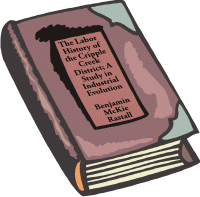 |
Victor
|
The Labor History of the Cripple Creek District;
A Study in Industrial Evolution
by Benjamin McKie Rastall

pages 52-53
DISCUSSIONS
Peculiarities Of The Strike
In the Cripple Creek strike one finds some marked peculiarities, phenomena in the field of strikes. Part of the union men worked all through the difficulty. Wherever a mine was found that would continue working, or would start to work, on the eight-hour schedule, or wherever a compromise could he reached as in the case of the Isabella, no attempt whatever was made to shut it down; the men continued to work as though nothing whatever had happened. This is in marked distinction from most strikes, where every union man is called out whether he has a grievance or not, and as many other allied occupations as possible affected by sympathetic strikes.
By its action in allowing the men to work the union gained in several ways. It kept a considerable amount of money coming into the pockets of union men, a goodly portion of which went to the support of the strike. It kept constantly before the eyes of the public, the fact that the men were not trying to introduce a new and unheard-of system, but one which was being successfully applied in a number of mines. It was a constant reminder that the men were not making exhorbitant [sic] demands to which it was impossible to accede, since mines of average yield were successfully operating under all the conditions which they asked. It is a question well worthy the careful consideration of organized labor everywhere, whether a similar action would not produce similar beneficial results in many a labor difficulty.
The exchange of prisoners near Bull Hill probably has no parallel in the history of strikes. When the five captured miners were exchanged for the three imprisoned officers with all the formality of war, the Altman union received recognition such as no other union has received before or since. Such recognition of an organization, and of a state of belligerency might have involved some interesting questions had the trouble gone further and Federal authority been invoked.
Another peculiarity of the strike was that state authority was used in such a way as materially to benefit the strikers. In the history of strikes the state has intervened nearly always only after a demand for protection, by the owners or operators, and while perhaps intending no such result, its authority has been so directed as to curtail the activities of the strikers, and to lessen greatly their chances for success. The results of this exception are interesting.
Governor Waite was a Populist, elected to his position on a Populist Labor ticket, and his ambition was to be known as the great friend of the laboring man. The strikers were sure of his hearty support from the first, and the county authorities were hampered by uncertainty as to whether his action would be to aid, or to oppose their efforts. All through the trouble his assertion was constant that no act of his should be hostile to the miners, and when at the very crisis he asserted that the deputy army was illegally assembled and should be disbanded, the effect was very great.1 The miners were wise enough to see their opportunity, and never in the slightest way to resist the state authorities, and hence they reaped the full benefit of the governor's friendship. It is doubtful whether without the moral and active support of state authority, exerted as it was at critical moments, the miners could have won their strike.
1Proclamation of Governor Waite, May 26, 1894
NEXT: The position of the mine owners — The position of the miners — The position of the governor